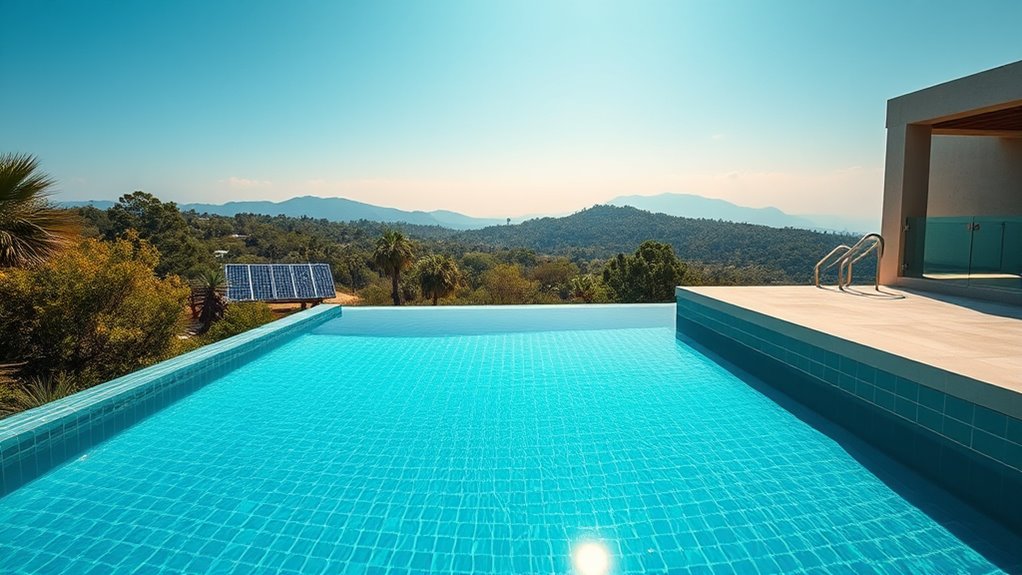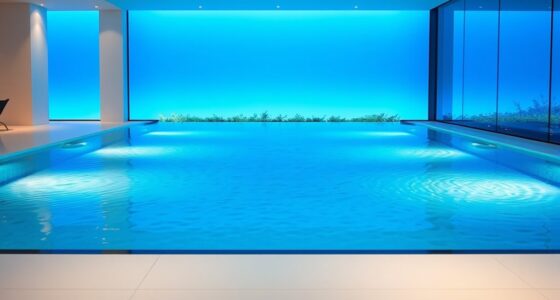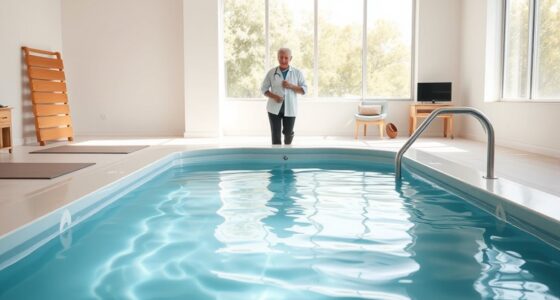Choosing an eco-friendly swimming setup involves considering energy use, water conservation, and sustainable materials. Endless pools typically use smaller, energy-efficient pumps, and their compact design reduces water needs, making them more environmentally friendly than traditional pools. They also incorporate eco-friendly insulation and smart controls to lower energy consumption. If you’re interested in a sustainable, cost-effective option, exploring these features further can help you make an informed choice to maximize environmental benefits.
Key Takeaways
- Endless pools use smaller, energy-efficient systems, significantly reducing electricity consumption compared to traditional large pools.
- They require less water due to their compact size, supporting water conservation strategies better than standard pools.
- Prefabricated and eco-friendly materials in endless pools decrease construction energy and environmental impact.
- Both pool types benefit from eco-friendly maintenance practices, but endless pools’ smaller size simplifies water and chemical management.
- Overall, endless pools offer a more sustainable option with lower energy use, water consumption, and environmental footprint.
Comparing Energy Consumption of Endless and Standard Pools
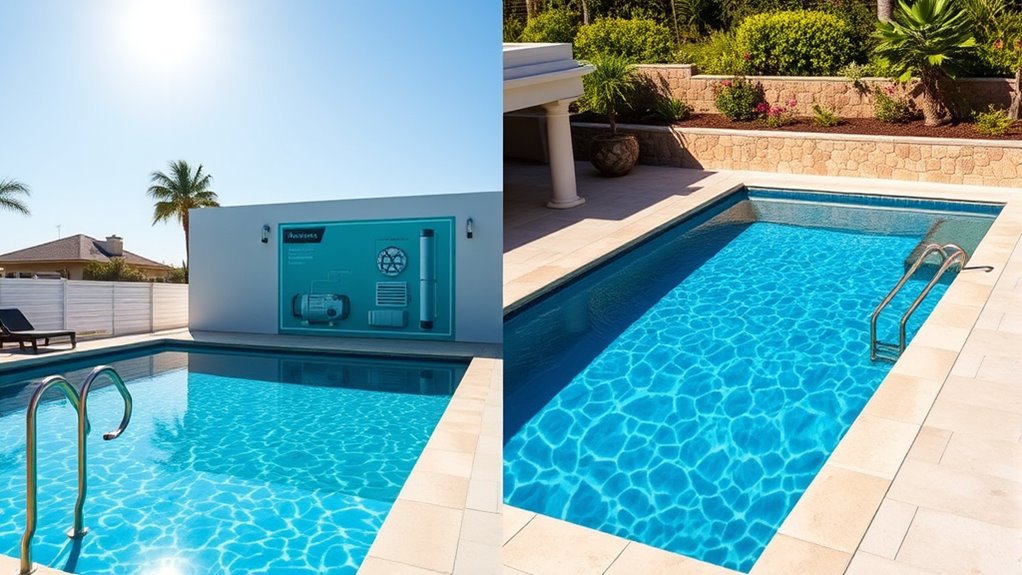
While standard pools rely on regular filtration and circulation systems that consume significant energy, endless pools are designed to be more efficient by using smaller, more targeted pumps and advanced technology. These pools typically operate with variable-speed pumps, allowing you to adjust energy use based on demand. Because the circulation system is smaller and more focused, it requires less power to run continuously. Additionally, some endless pools incorporate energy-efficient insulation and smart controls that optimize operation times, reducing overall consumption. Compared to traditional pools, which can use thousands of kilowatt-hours annually, endless pools often cut energy use by a substantial margin. This efficiency not only saves you money but also reduces your environmental impact, making endless pools a greener choice. Moreover, the energy-efficient features of endless pools contribute significantly to lowering their overall energy footprint.
Water Usage and Conservation Strategies in Different Pool Types
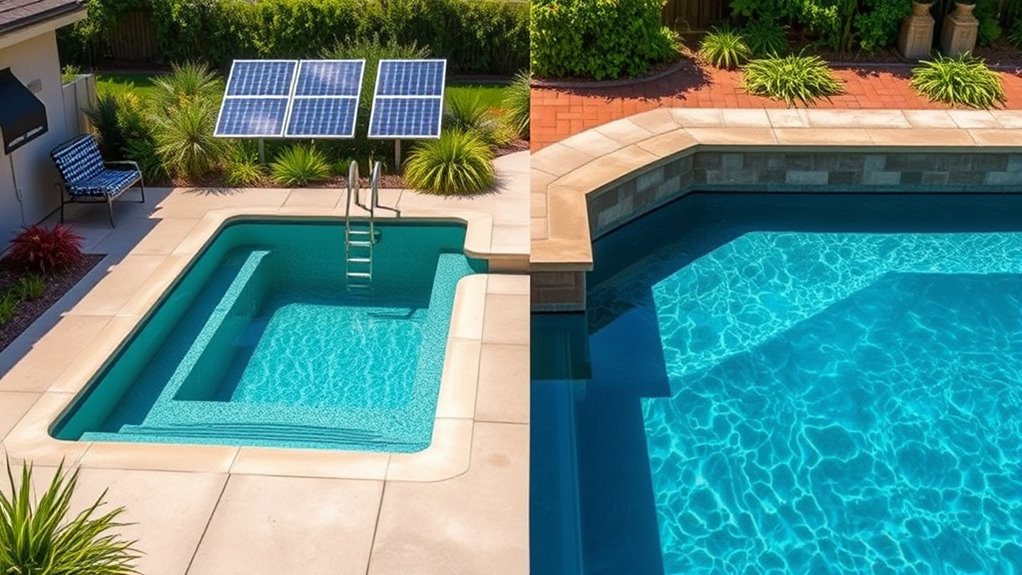
You can reduce water waste by choosing pools with effective recycling systems that reuse filtered water. Considering pool size also helps, as smaller or more efficiently designed pools use less water overall. Implementing these strategies makes your swimming habits more eco-friendly and sustainable. Additionally, selecting pools with whole-house filtration systems can further optimize water quality and conservation efforts.
Water Recycling Methods
Different pool types employ various water recycling methods to reduce overall consumption and promote sustainability. Endless pools often use closed-loop systems that continuously filter and recirculate water, minimizing waste. You’ll find that these pools typically incorporate advanced filtration and UV or ozone sterilization, reducing the need for chemical treatments and water replacement. Standard pools, on the other hand, usually rely on backwashing filters to remove debris, which can waste significant amounts of water unless managed carefully. Some standard pools incorporate cover systems to cut evaporation, conserving water between uses. Both types may utilize automated systems to monitor water quality and optimize recirculation, but endless pools tend to be more efficient due to their integrated, self-contained design. Additionally, Hyundai Tuning techniques can be applied to pool equipment to further optimize performance and water efficiency. Overall, choosing pools with effective recycling methods helps conserve water and supports eco-friendly swimming.
Pool Size Efficiency
Pool size considerably impacts water usage and the effectiveness of conservation strategies. Larger pools, like standard models, require more water overall but can benefit from strategies like cover use and filtration efficiency. Smaller pools, such as Endless Pools, naturally use less water, making conservation easier. To illustrate, consider this table:
| Pool Type | Water Usage | Conservation Strategy |
|---|---|---|
| Standard Pool | High; thousands of gallons per fill | Cover when not in use, efficient filtration |
| Endless Pool | Low; a few hundred gallons per fill | Cover, minimal water replacement |
| Large Pool | Very high; significant evaporation | Use covers, optimize filtration |
| Small Pool | Low; easy to maintain | Cover, monitor water quality |
Choosing a smaller pool enhances efficiency, while larger pools demand more conservation effort. Additionally, water evaporation can significantly affect overall water loss, emphasizing the importance of effective covers and maintenance.
Environmental Impact of Pool Construction Materials and Processes
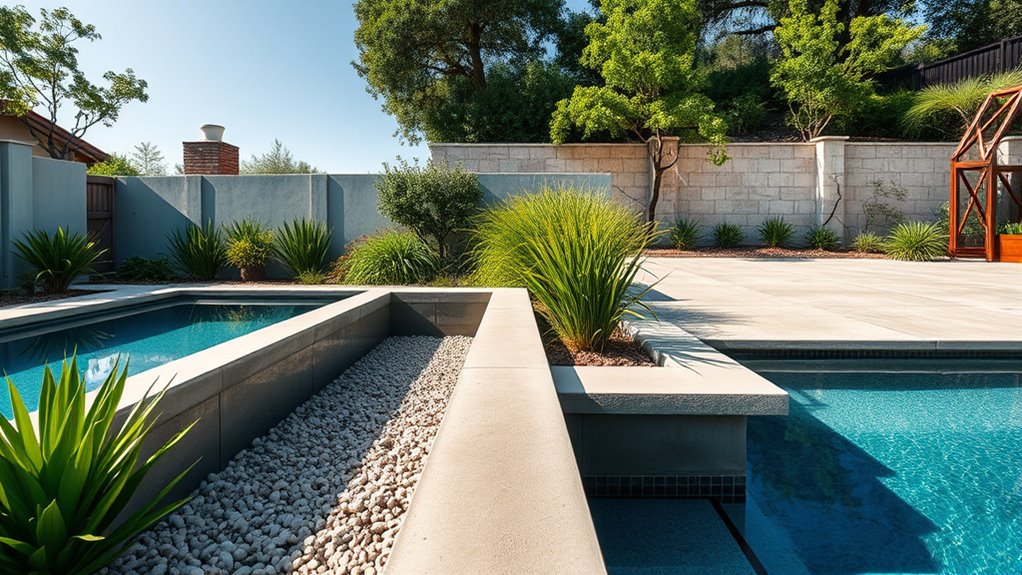
When choosing pool construction materials, you can reduce environmental harm by selecting sustainable options. Keep in mind that the energy used during construction also impacts your pool’s overall footprint. Additionally, adopting eco-friendly maintenance practices helps minimize long-term environmental effects. Incorporating vertical storage solutions and other organization strategies can also help reduce clutter and waste associated with pool accessories and supplies.
Material Sustainability Choices
Choosing eco-friendly materials for pool construction can markedly reduce environmental impacts, making your project more sustainable from the outset. Opt for recycled or sustainably sourced materials like reclaimed wood, recycled steel, or biodegradable composites to minimize resource depletion. Use low-VOC or non-toxic sealants and paints to reduce harmful emissions during and after construction. Consider concrete mixes with recycled aggregates to lower carbon footprints. Additionally, choosing materials with long lifespans reduces the need for frequent replacements, conserving resources over time. Incorporate attention to detail in selecting materials to ensure they meet both durability and eco-friendly standards. Avoid materials with high embodied energy or those derived from non-renewable sources. By prioritizing sustainable options, you help lower pollution, decrease waste, and promote a healthier environment, ensuring your pool’s construction aligns with eco-friendly principles from start to finish.
Construction Energy Use
Have you considered how the energy used in manufacturing and installing pool materials impacts the environment? Traditional pools often require extensive excavation and concrete use, which consume large amounts of energy and produce significant emissions. The production of concrete and steel involves energy-intensive processes that contribute to greenhouse gases. Additionally, installing these materials demands heavy machinery, further increasing energy consumption. Endless Pools, with their prefabricated and modular designs, typically use less energy during construction because they require minimal on-site work and fewer raw materials. By choosing eco-friendly materials and streamlined construction methods, you can reduce your pool’s overall carbon footprint. Moreover, manufacturing processes for pool materials greatly influence the total energy consumption and environmental impact. Being mindful of construction energy use helps you make more sustainable choices, ultimately lowering environmental impact from the very beginning of your pool’s life cycle.
Pool Maintenance Practices
Ever wondered how your pool maintenance habits impact the environment? Your choices in cleaning, chemical use, and water management can reduce ecological harm. Opt for eco-friendly cleaning products that avoid harsh chemicals, and regularly maintain your filtration system to minimize water and energy waste. Using solar covers can decrease evaporation and heat loss, saving energy. Be mindful of the materials you use—choose sustainable, non-toxic options for repairs and upgrades. Proper chemical balancing prevents overuse and runoff, protecting local water sources. Here’s a quick guide:
| Practice | Environmental Benefit | Tips |
|---|---|---|
| Eco-friendly cleaning | Reduces chemical runoff | Use biodegradable products |
| Water conservation | Saves water, reduces waste | Cover pool when inactive |
| Chemical management | Minimizes pollution | Regular testing, proper dosing |
| Solar heating | Cuts energy use | Install solar covers or heaters |
| Material choices | Low environmental impact | Use sustainable, non-toxic materials |
Additionally, selecting environmentally friendly pool construction materials can significantly lower the overall ecological footprint of building and maintaining your pool.
Operational Costs and Energy Efficiency Features

While eco-friendly swimming pools often require a higher initial investment, their operational costs tend to be considerably lower over time due to energy-efficient features. These pools often include advanced heating systems, LED lighting, and efficient pumps that reduce energy consumption. To maximize savings, consider:
- Installing a variable-speed pump that adjusts energy use based on demand.
- Using solar heating options to cut down on electricity or gas costs.
- Incorporating smart controls to optimize pool operation and minimize waste.
- Choosing energy-efficient equipment such as collagen or hyaluronic acid-infused eye patches that provide targeted benefits with minimal adverse effects.
These features not only lower your ongoing expenses but also decrease your environmental impact. Over time, the savings on energy bills can outweigh the initial setup costs, making eco-friendly pools a smart investment for sustainable swimming.
Space Efficiency and Design Flexibility
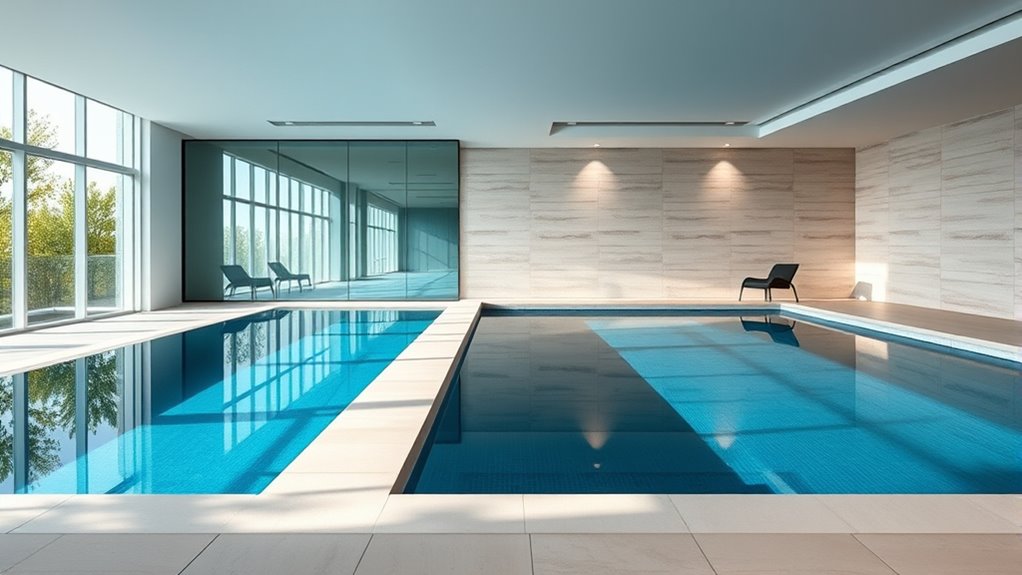
You’ll appreciate how eco-friendly pools maximize space with a compact footprint, making them ideal for smaller yards. With customizable layout options, you can tailor your pool’s design to fit your specific needs and preferences. This flexibility guarantees you get a functional, stylish swimming area without sacrificing valuable outdoor space. Additionally, their space efficiency makes them a smart choice for environmentally conscious homeowners seeking versatility.
Compact Footprint Advantage
The compact footprint of eco-friendly swimming pools offers significant advantages in space efficiency and design flexibility. With less space needed, you can install these pools in smaller yards, basements, or even indoors, making them ideal for urban areas. This smaller size opens up options for integration into existing structures or multi-purpose spaces.
Consider these benefits:
- They fit comfortably in limited outdoor areas, saving valuable yard space.
- Their sleek design allows seamless integration into various architectural styles.
- You can install them indoors, enabling year-round use regardless of weather.
This compact design not only conserves space but also simplifies installation and maintenance, giving you more flexibility to enjoy swimming without sacrificing your property’s layout or aesthetics.
Customizable Layout Options
Because of their customizable layout options, eco-friendly swimming pools can be tailored to fit your specific space and design preferences. Endless Pools, in particular, offer flexible configurations that adapt to your home’s layout, whether you have a small backyard or a larger outdoor area. You can choose the pool’s length, width, and depth to optimize space and functionality. This flexibility allows you to incorporate features like integrated benches, resistance jets, or even combination areas for relaxation and exercise. Standard pools, while customizable, often require more extensive construction and may have limited options for adjusting shape or size once built. With eco-friendly pools, you gain the advantage of designing a space that’s both efficient and visually appealing, perfectly aligned with your lifestyle and environmental goals.
Use of Renewable Energy Sources in Pool Operation
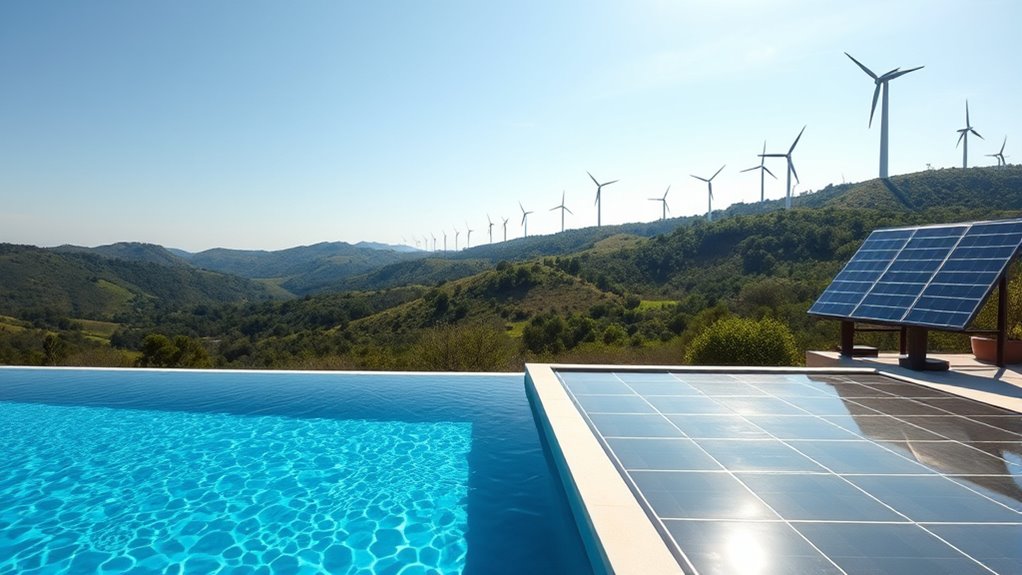
Integrating renewable energy sources into pool operations offers a practical way to reduce environmental impact and lower energy costs. You can harness solar, wind, or geothermal energy to power your pool system effectively. Solar panels are the most common choice, converting sunlight into electricity or heating water directly. Using renewable energy can:
- markedly cut your energy bills by reducing reliance on grid power.
- Lower your carbon footprint, helping combat climate change.
- Increase your pool’s sustainability, appealing to eco-conscious users.
Longevity and Maintenance Requirements for Sustainability
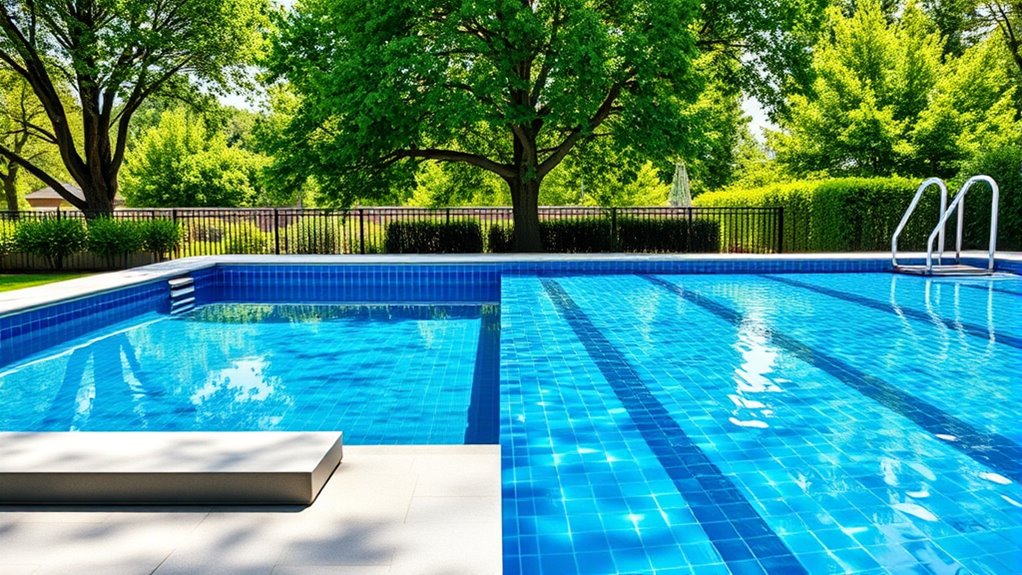
Adopting renewable energy sources for your pool not only reduces environmental impact but also emphasizes the importance of equipment that lasts over time. Endurance is key when considering sustainability, so choose pools with durable materials and reliable components. Endless Pools typically feature compact, well-designed systems that require less frequent repairs, thanks to their simplified setup. Standard pools often need more maintenance due to larger structures and complex systems, increasing wear and tear. Regular upkeep, like cleaning filters and balancing water chemistry, extends equipment lifespan and minimizes environmental waste. Investing in high-quality, energy-efficient equipment ensures your pool remains eco-friendly while reducing long-term costs. Ultimately, prioritizing longevity and manageable maintenance keeps your pool sustainable, saving resources and supporting your eco-conscious lifestyle over years.
Water Heating Options and Energy Savings

Choosing energy-efficient water heating options can substantially lower your pool’s environmental footprint and reduce ongoing costs. To maximize savings, consider the following:
- Solar Heating Systems: These harness sunlight to warm your pool naturally, drastically cutting energy use.
- Heat Pumps: They extract heat from the air, offering efficient heating even in cooler weather.
- Energy-Efficient Gas Heaters: Modern models burn less fuel and heat water faster, reducing energy waste.
Each option varies in initial investment and climate suitability, but all aim to lower your carbon footprint. Solar systems are ideal for sunny regions, while heat pumps work well in moderate climates. Gas heaters provide quick heating but consume more energy. Choosing the right system depends on your pool size, location, and budget.
Material Sustainability and Eco-Friendly Pool Components

Opting for sustainable materials and eco-friendly components can considerably reduce your pool’s environmental impact. Choosing recycled or responsibly sourced materials minimizes resource depletion and waste. For example, eco-friendly pool liners made from recycled plastics or non-toxic, biodegradable finishes help protect ecosystems. Additionally, selecting components like energy-efficient pumps and filters enhances sustainability. Here’s a quick comparison:
| Material/Component | Eco-Friendly Benefits | Typical Use |
|---|---|---|
| Recycled plastics | Reduces landfill waste, conserves resources | Pool liners, decking |
| Low-VOC paints | Limits harmful emissions, improves air quality | Pool exteriors |
| Bamboo or FSC-certified wood | Sustainable, fast-growing, renewable | Pool surrounds |
| Non-toxic sealants | Safer for aquatic life, reduces chemical runoff | Pool joints, interiors |
Overall Environmental Footprint and Long-Term Benefits
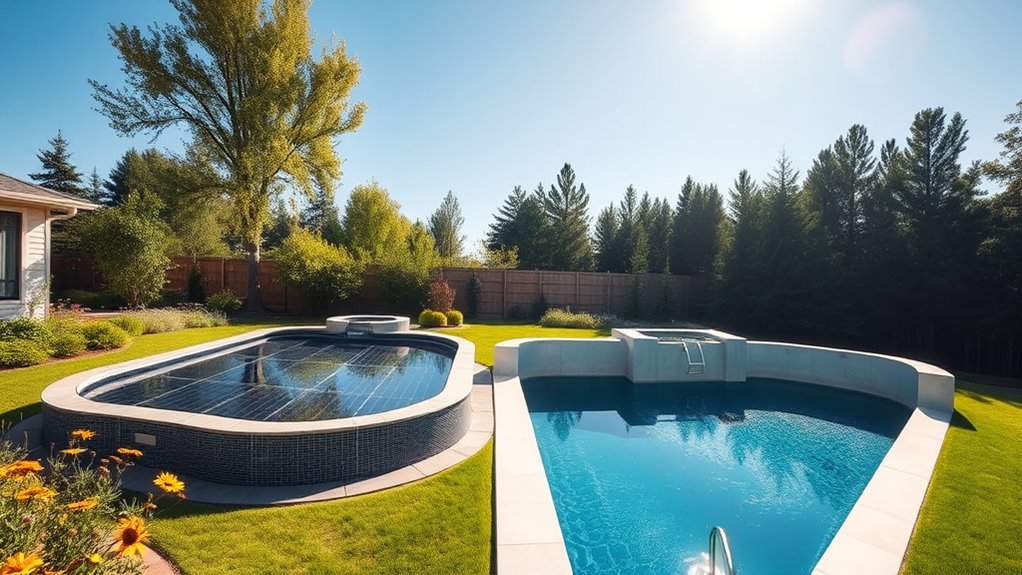
Have you considered how your pool’s overall environmental footprint impacts the planet over time? Choosing an eco-friendly pool can make a significant difference. Endless pools typically have a smaller footprint due to their energy-efficient systems and minimal water use. Standard pools often require more resources, leading to higher emissions and waste.
Here are key long-term benefits:
- Reduced energy consumption saves money and lowers greenhouse gas emissions.
- Lower water usage minimizes strain on local water supplies.
- Sustainable materials and efficient systems increase durability, reducing the need for frequent replacements.
Frequently Asked Questions
How Do Endless Pools Impact Local Biodiversity Compared to Traditional Pools?
Endless pools typically have less impact on local biodiversity than traditional pools because they use smaller volumes of water and require less chemical treatment. You’ll find they produce fewer chemical runoff and less heat pollution, which helps protect nearby plants and animals. By choosing an endless pool, you’re reducing environmental stress on your local ecosystem, making it a more eco-friendly option that supports biodiversity better than larger, conventional pools.
Are There Eco-Friendly Certifications Specific to Pool Construction and Operation?
Imagine your pool as a green oasis—there are eco-friendly certifications like LEED and WaterSense that can help. These labels verify your pool’s construction and operation prioritize sustainability, from energy efficiency to water conservation. By choosing certified options, you’re planting seeds for a healthier environment, making your backyard a sanctuary that nurtures both your enjoyment and the planet’s well-being. Certifications turn your pool into a badge of eco-consciousness.
Can Pool Cover Technologies Improve Environmental Sustainability?
Yes, pool cover technologies can substantially boost environmental sustainability. By using insulated covers, you minimize heat loss, reducing energy needed to maintain water temperature. Solar covers harness sunlight to warm the pool naturally, lowering reliance on electric heaters. Automated covers save water by reducing evaporation and debris entry, while durable, eco-friendly materials lessen environmental impact. Incorporating these covers helps you save energy, conserve water, and decrease your pool’s overall carbon footprint.
What Are the Environmental Benefits of Saltwater Pools Versus Chlorine Pools?
Saltwater pools are more environmentally friendly because they use salt to generate chlorine, reducing the need for chemical additives and minimizing chemical runoff. They also require less frequent chemical treatments, lowering overall chemical usage. Additionally, saltwater systems tend to be gentler on skin and eyes, leading to fewer chemical-related health issues. By choosing a saltwater pool, you contribute to a greener environment and enjoy a more natural swimming experience.
How Do Pool Water Recycling and Filtration Systems Contribute to Sustainability?
Imagine you’re back in the days of leech therapy, but today, pool water recycling and filtration systems work wonders for sustainability. You can reduce water waste by reusing and cleaning pool water efficiently, cutting down on fresh water consumption. Modern filtration systems also lower chemical use and energy, making your swim eco-friendlier. By upgrading these systems, you actively contribute to conservation efforts, helping protect our planet while enjoying your swim.
Conclusion
Choosing between an endless pool and a standard one is like picking a partner for your eco-friendly journey—each has its own rhythm and charm. By weighing their energy use, water conservation, and sustainable materials, you can find a pool that fits your lifestyle while treading lightly on the planet. Think of it as planting a seed today that blooms into a greener, more invigorating oasis tomorrow, where your love for swimming nurtures both you and the Earth.
